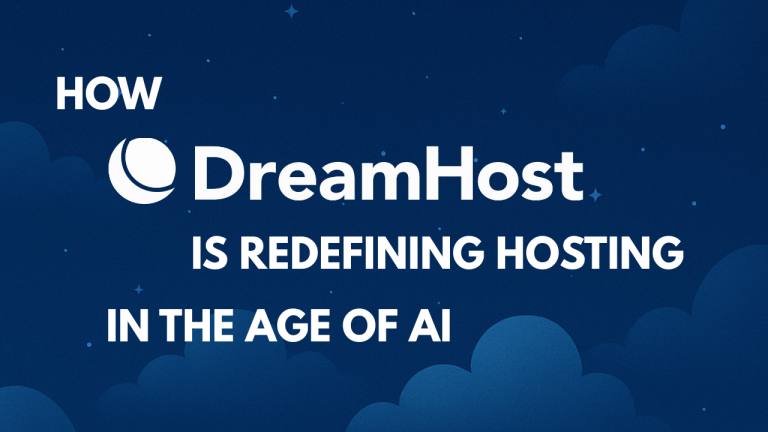A simple but revealing idea is circulating across the hosting world: most people want a website, but almost no one wants to build one. It is a sentiment that DreamHost veteran Dallas Kaszuba believes defines the state of the industry today. After decades working with the earliest layers of the internet, he argues that hosting is no longer just about servers, software, or infrastructure. It is ultimately about helping users achieve outcomes without requiring them to become web developers.
From Experimental Beginnings to a Shift in Mindset
DreamHost was founded in 1997 when the web was chaotic, experimental, and largely unstructured. Kaszuba recalls that the company emerged almost by accident. He and his college friends were experimenting, writing code, and building internal tools for fun. Billing systems, bug trackers, server software, and internal platforms were all built from scratch, long before the market offered ready-made solutions.
For years, DreamHost remained deeply technical and heavily invested in open source. The company contributed to major projects such as Ceph and OpenStack. However, Kaszuba says the industry has evolved. The focus has moved from technology-first to user-first. In his view, technology should now serve as the tool, not the centerpiece.
AI Arrives to Solve an Old Problem
Artificial intelligence is now changing the hosting landscape in a profound way. While other industries treat AI as a futuristic add-on, hosting providers see it as the answer to a long-standing challenge. Users want results, not the process. They want a live website without navigating templates, dragging widgets, or configuring settings.
This insight drives DreamHost’s new initiative: offering free, AI-generated starter websites for anyone. The concept is simple. By using AI and automation, DreamHost can generate an initial version of a website in minutes. The goal is to eliminate the friction that stops many users from getting started.
Kaszuba notes a surprising behavior pattern. Even when the first version of a website is provided at no cost, many customers still hesitate to move forward. It highlights how the barrier is psychological as much as technical. People want effortless outcomes, but taking the first step still feels intimidating.
Beyond Tools and Templates: AI as the New Website Builder
Traditional website builders have defined the hosting industry for years. They offered drag-and-drop editors, templates, and layout tools. But Kaszuba believes their era is nearing its end. AI can now assemble pages, generate layouts, and adapt content far faster than a human-driven editor.
Instead of dragging sections or selecting templates, users will simply describe their needs. A request such as “Create a homepage for my bakery with my menu and colors” becomes a full website automatically generated within seconds. The shift is not merely technical. It redefines the user’s expectations of what “easy” means.
Once users experience this level of speed and automation, the standard for simplicity changes permanently. Kaszuba sees this as the pivotal moment that will reshape the next decade of hosting.
The Human Role Remains Essential
Despite the rise of automation, DreamHost remains committed to keeping humans in the loop. Kaszuba emphasizes that support teams are not a backup plan but a core part of the product. While AI performs the routine tasks, humans address the moments that require judgment, empathy, or reassurance.
This philosophy pushes against a growing trend in technology. Many companies are pursuing full automation, reducing support departments, and replacing everything possible with bots. DreamHost takes the opposite approach. The company believes users trust humans more than code, especially during stressful moments such as website outages or configuration problems.
Building a Hybrid Experience: Automation Plus Human Collaboration
DreamHost is exploring new approaches to support that blend automation with human collaboration. A user experiencing difficulty may not need to file a ticket. Instead, a support engineer could join their session instantly, view the issue in real time, and work collaboratively to resolve it. This transforms support from a reactive function into a live, interactive service.
In a world where AI handles repetitive tasks, the human touch becomes the core differentiator. Hosting companies may find that their true value lies not in infrastructure but in empathy, guidance, and direct assistance.
The Bigger Message for the Hosting Industry
Kaszuba frames this shift as part of a larger evolution. In the early internet era, value was tied to hardware and physical infrastructure. Later, it moved toward software, control panels, and automation tools. Today, value is moving again — toward interpreting user intent and eliminating friction.
Hosting companies that continue to define themselves by uptime metrics, CPUs, or control panels may be speaking a language that no longer resonates. These are now baseline expectations, not competitive advantages.
The next advantage comes from understanding what users truly want: a simple path from idea to result. AI delivers the speed and automation. Humans deliver trust and context. And hosting providers deliver the quiet infrastructure that powers everything behind the scenes.
The Future Hosting Company Will Not Look Like the Past
The industry is at an inflection point. As AI becomes embedded in the core hosting workflow, providers must rethink their identity. The hosting company of the future may look less like a technical service provider and more like a friction-removal partner — a blend of automation, intelligence, and human collaboration that helps ideas reach the internet quickly and gracefully.
In this vision, hosting becomes less visible but more valuable. The work shifts from managing servers to enabling outcomes. The companies that adapt to this approach will define the next era of the web.

